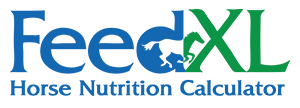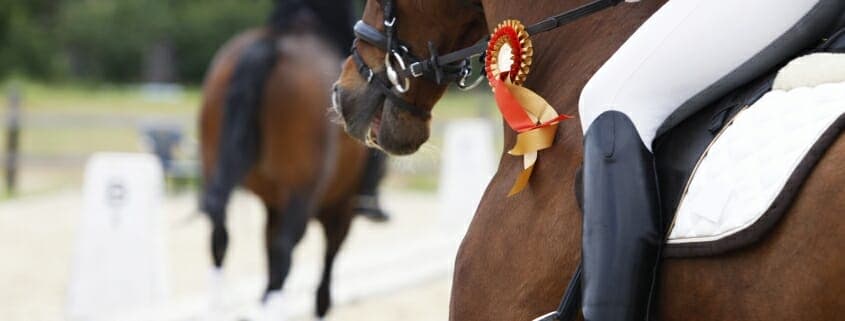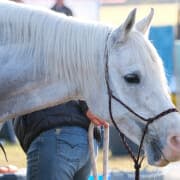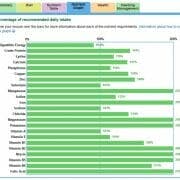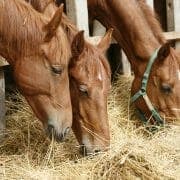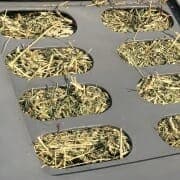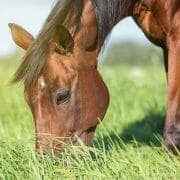How to Check If Everything You’ve Entered into FeedXL Is Accurate
When using FeedXL you need to remember it is a tool designed to help you assess your horse’s diet. It is really important you look to see if what FeedXL is telling you matches what your horse is telling you from body fatness perspective.
The FIRST thing to do is take a look at a horse’s current diet in FeedXL and compare what the horse is doing WEIGHT WISE with what FeedXL is telling you from a Digestible Energy perspective.
This will give you an indication of whether or not you have entered your horse’s details, and diet details, accurately. And it gives you a great place to start to build a new, balanced diet.
How to know that the horse and diet details have been entered accurately:
Digestible energy is LOW and your horse is losing weight
If you input your horse and his CURRENT diet and find that the digestible energy amount is LOW (less than 85% of daily requirement) and your horse is losing weight, this tells you that this is accurate. Most horses would lose weight with their daily energy intake that low. So you can be confident you have entered both your horse’s and diet details accurately.
Digestible Energy is GOOD and your horse is maintaining weight
If your horse’s digestible energy is about where it should be (somewhere between 85% and 105% of requirements) AND your horse is maintaining weight, this also tells you your horse’s details you have entered and the diet you have entered is accurate.
Digestible energy is HIGH and your horse is gaining weight
If your horse’s digestible energy is high (more than 105%) and your horse is gaining weight, this is also accurate.
Potential Red Flags
Here are some scenarios that raise red flags and suggest that you need to go back and check either a horse’s details or the diet details:
Digestible energy is LOW but the horse is maintaining or gaining weight.
If FeedXL is telling you your horse’s digestible energy is too low BUT your horse is maintaining or maybe even gaining weight, something you have entered may not be correct.
Things to check here are:
- Horse’s bodyweight – if you have the bodyweight too high this increases the calculated energy requirement and will make the digestible energy in the diet appear low. Check your horse’s bodyweight using the girth and length measurement in FeedXL. For more info on how to enter your horse’s measurements to calculate bodyweight, click here to read our post ‘Accurate Information In, Accurate Diets Out’.
- Workload – if you have your horse’s workload set higher than it actually is this will increase digestible energy requirement and make your horse’s digestible energy in FeedXL appear low. Double check you have entered an accurate workload.
- Keeper/Doer Status – If you enter your horse as a hard keeper this increases estimated energy requirement. If your diet appears low in energy but he is actually holding weight, try changing keeper status just to ‘normal’.
- Underestimated pasture quality or quantity – if you enter your pasture at a lower quality than it actually is, or say it is overgrazed when it’s not, this will reduce the estimated contribution of digestible energy to the diet. If you are not sure how you should enter your pasture head on over to our FeedXL Nutrition Forum and post some photos. Lots of our members or our nutrition team will happily help you out!
- Inaccurate weight of hay or feeds being entered – If you haven’t weighed your hay or feeds you may have entered less than you are actually feeding. Go get yourself some scales (luggage scales work great for the hay) and weigh everything so you can enter the weights you are feeding accurately.
Digestible energy is HIGH but the horse is losing or only maintaining weight.
If FeedXL is telling you Digestible Energy is high (above 105%) but your horse is only just maintaining weight or possibly even losing weight, something may be not quite right.
Things to check here are:
- Horse’s bodyweight – if you have the bodyweight too low this reduces the calculated energy requirement and will make the digestible energy in the diet appear high. Check your horse’s bodyweight using the girth and length measurement in FeedXL. For more info on how to enter your horse’s measurements to calculate bodyweight, click here to read our post ‘Accurate Information In, Accurate Diets Out’.
- Workload – if you have your horse’s workload set lower than it actually is this will reduce digestible energy requirement and make your horse’s digestible energy in FeedXL appear high. Double check you have entered an accurate workload.
- Keeper/Doer Status – If you enter your horse as an easy keeper this lowers estimated energy requirement. If your diet appears high in energy but he is actually losing or holding weight, try changing keeper status just to ‘normal’.
- Overestimated pasture quality or quantity – if you enter your pasture at a higher quality than it actually is, or don’t indicate it is overgrazed when it is, this will increase the estimated contribution of digestible energy from pasture to the diet. If you are not sure how you should enter your pasture head on over to our FeedXL Nutrition Forum and post some photos. Lots of our members or our nutrition team will happily help you out!
- Inaccurate weight of hay or feeds being entered – If you haven’t weighed your hay or feeds you may have entered more than you are actually feeding. Go get yourself some scales (luggage scales work great for the hay) and weigh everything so you can enter the weights you are feeding accurately.
There are other, more complex reasons why digestible energy may appear high or low and not match what your horse is telling you. For example, you may be feeding an ingredient like raw corn that will reduce your horse’s ability to digest fibre. Or you may be feeding too much feed and increasing passage rate through the gut and in doing so reducing digestion.
If you aren’t sure how to interpret what you are seeing in your diet jump on our Horse Nutrition Forum on Facebook. Lots of our members and our nutrition team will be happy to help!
Is it time to join FeedXL for your horses health?
Get EVEN MORE practical and personalised feeding guidance when you sign up to FEEDXL.
Do you have a question or comment? Do you need help with feeding?
We would love to welcome you to our FeedXL Horse Nutrition Facebook Group. Ask questions and have them answered by PhD and Masters qualified equine nutritionists and spend time with like-minded horse owners. It’s free!
Click here to join the FeedXL Horse Nutrition Facebook Group
